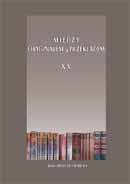Czy zachowanie obcych elementów w przekładzie może być korzystne?
Is conduct foreign elements in translation can be beneficial?
Author(s): Danuta KucałaSubject(s): Literary Texts
Published by: KSIĘGARNIA AKADEMICKA Sp. z o.o.
Summary/Abstract: In this paper the author compares certain linguistic elements (proper names, place and institution names, titles of literary and art works, as well as expressions which have no equivalents in a different language) in the original and in two translations (Czech and Polish) of the collective work - Historia de España. The analysis assumes the reader’s point of view and concentrates on the techniques in which the translators transferred into the TLT words and expressions mentioned above, as well as if the information clarifying some historical and cultural strangeness is accessible. In the author’s opinion, the special function of the text (history of a different country) requires that the discussed words and expressions should be preserved in their original versions in the translated text, so as the reader could be constantly aware of its different cultural identity. This is particularly important in case of titles of literary and art works (the Czech translation has failed to do it). At the same time, the reader is entitled to find effortlessly a clear and convincing explanation, although it is the translator who decides upon its form (initial or final commentary, note, glossary of terms) and its place in the TLT.
Journal: Między Oryginałem a Przekładem
- Issue Year: 2009
- Issue No: 15
- Page Range: 173-183
- Page Count: 11
- Language: Polish

